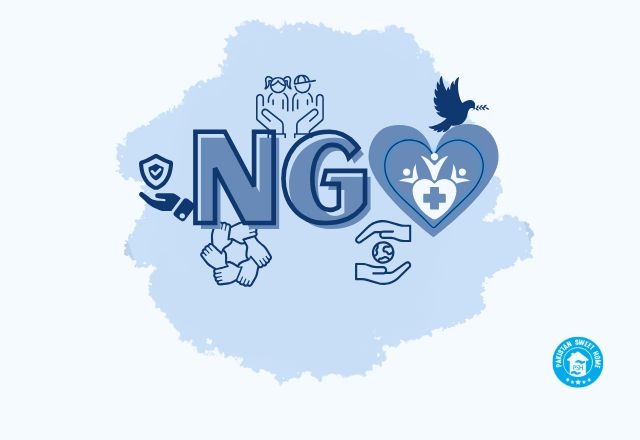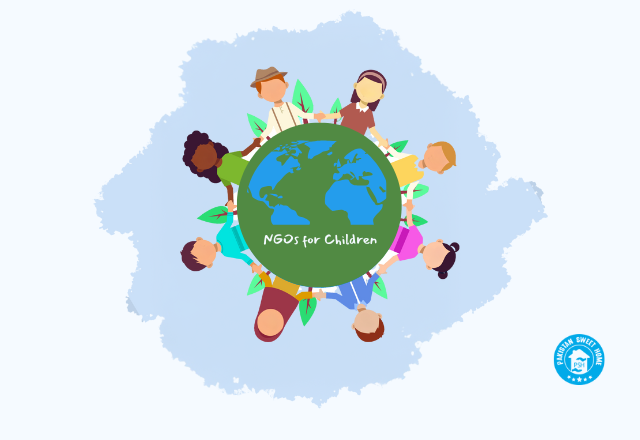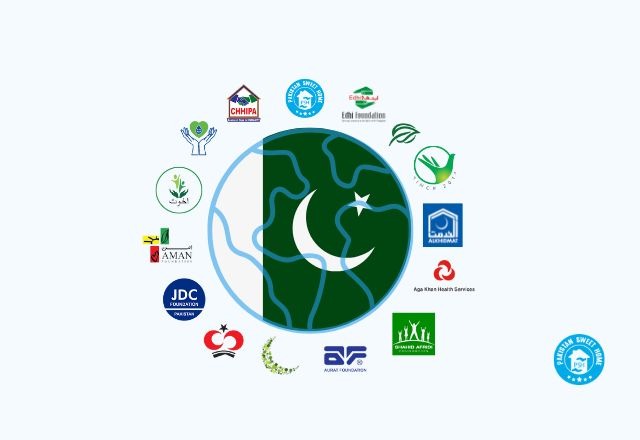A Non-governmental Organization (NGO) is a voluntary group of individuals or organizations that is usually not associated with any government.
NGOs are typically formed to provide services, promote public policies, or address various social issues. Some NGOs operate as for-profit corporations, and the majority are nonprofit entities. They can focus on local, national, or international issues.
The functions of NGOs can range from humanitarian aid and disaster relief to human rights advocacy and environmental protection.
Let's explore the history, scope, structure, creation, and challenges that NGOs face.
A Brief History of NGOs
NGOs have a long history, with some tracing their origins back to the early 20th century. In 1910, about 130 international groups formed a coordinating body known as the Union of International Associations.
The term "nongovernmental organization" gained importance around 1945 during the founding of the United Nations (UN). It aimed to differentiate private organizations from intergovernmental organizations (IGOs).
Since then, NGOs have increased in number, especially after World War II and into the 1970s. This growth was driven by factors such as globalization, the spread of democracy, and advances in communication technology.
The Scope of NGO Activities
NGOs address a wide range of issues and operate across various sectors, focusing on significant human and environmental concerns.
Here are some key areas where NGOs make a significant impact:
- Human Rights: Many NGOs focus on advocating and protecting human rights. They work to ensure justice, equality, and freedom for all individuals around the globe.
- Environmental Protection: Several NGOs work in the field of environmental conservation, aiming to preserve natural resources. They also protect endangered species and promote sustainability.
- Disaster Relief: NGOs provide humanitarian aid and disaster relief during natural disasters, armed conflicts, or other emergencies. For example, Pakistan Sweet Home was founded after a terrible flood in Pakistan and has since made great progress in caring for orphaned children.
- Development Assistance: Some NGOs dedicate their efforts to combating poverty and fostering sustainable development. They help to build better infrastructure and improve education in underdeveloped communities.
NGOs can also serve a quasi-governmental role, especially for ethnic groups that lack state representation. They advocate for their rights and interests at the national and international levels. These activities highlight the diverse roles NGOs play in improving society and addressing critical global challenges.
How NGOs Are Funded?
NGOs are funded through various sources, including private donations, government grants, and contributions from international organizations. This diverse funding structure allows NGOs to maintain a level of independence while also enabling them to undertake large-scale projects and initiatives.
NGO Structure and Influence
There are different types of NGOs, like transnational federations or grassroots organizations that concentrate on local issues. Regardless of their size or type, NGOs share a common belief that individuals working together can drive meaningful change.
Different types of NGOs play key roles in addressing global campaigns against social injustices and environmental threats. These organizations also have a significant influence on governments and intergovernmental organizations (IGOs) by participating in meetings where policies, treaties, and conventions are negotiated.
How to Create an NGO?
Creating a Non-Governmental Organization (NGO) involves a series of steps that establish its purpose, structure, and legal status.
Here are the general steps you should consider when forming an NGO:
1. Define Your Vision and Purpose
The first step in creating an NGO is to define your mission, vision, and purpose. This includes answering questions like:
- What is the core problem or need you want to address?
- What is your ultimate goal?
- What values and principles will guide your organization?
2. Draft the Statutes
Statutes are the foundational documents that outline how your NGO will operate. They should include:
- The official name of your NGO
- The organizational structure, including roles and responsibilities
- The governance model, such as how decisions are made
- The process for amending statutes
- Policies for meetings, elections, and other key procedures
3. Choose a Unique Name and Find a Headquarters
Your NGO's name should be unique to avoid conflicts with existing local organizations. Conduct thorough research to ensure it's not already in use. Additionally, you'll need to establish a headquarters, whether it's a dedicated office space or a home office.
4. Define the Scope of Action and Activities
Determine the geographical scope of your NGO, whether it's local, national, or international. You should also describe the specific activities and programs your NGO will undertake to achieve its objectives.
5. Identify Founding Members and Roles
Identify the individuals who will serve as the founding members of your NGO. Define their roles and responsibilities, such as board members, officers, or executive directors.
6. Establish the Funding Structure
Since NGOs are typically nonprofit, consider how your organization will be funded. Common sources of funding include:
- Donations from individuals
- Grants from foundations or government entities
- Corporate sponsorships
- Fundraising events and campaigns
7. Determine the Legal Form of Your NGO
NGOs can take various legal forms, such as associations or foundations. Each form has specific requirements, so research the legal framework in your country to ensure compliance. Choose the form that best suits your NGO's objectives and operational structure.
8. Draft the Founding Act
The founding act is the official document that formalizes the creation of your NGO. It should include:
- Details about the founding members and their roles
- Acceptance of the statutes
- Information about the organization's mission and activities
9. Register Your NGO
Once you've drafted the necessary documents, register your NGO with the appropriate governmental body or registry. This step provides legal recognition and allows you to operate officially.
10. Obtain Tax Identification and Social Security Registration
You'll need to obtain a Tax Identification Number (TIN) from the relevant tax authority to conduct financial transactions and hire workers. Additionally, register with Social Security if you plan to employ staff.
11. Develop a Governance Structure and Operational Plan
Create a clear governance structure that outlines decision-making processes, board meetings, and the roles of key personnel. Develop an operational plan that details your NGO programs, activities, and timelines.
12. Start Operations and Build Partnerships
With the legal and administrative work completed, you can start your NGO activities. Build partnerships with other organizations, government agencies, and stakeholders to increase your impact.
Note: Remember, each country has unique regulations, so adapt this guide to your specific context and legal requirements.
Challenges Faced by NGOs
Despite their positive impact, NGOs face various challenges, including:
- Coordination: The large number of NGOs and their diverse approaches can make it difficult to coordinate efforts on specific issues.
- Representativeness: Some international NGOs claim to represent certain regions or groups, but their leadership might not be reflective of those demographics.
- Government Restrictions: Certain governments may view NGOs as undemocratic or seek to limit their influence in international decision-making.
- Despite these challenges, NGOs still play a crucial role in tackling global problems and pushing for positive change. Through their expertise and grassroots efforts, NGOs continue to be a driving force in promoting social justice, environmental sustainability, and humanitarian relief.
Are NGOs Helping or Hurting Progress?
NGOs are often created to improve civil society, but they can sometimes cause harm instead.
For example:
In 2020, more than 1,000 current and former employees of Doctors Without Borders (MSF) accused the organization of discrimination and unequal pay. Expatriate workers were earning six times more than local staff, causing significant hardship, such as having to skip meals.
This scandal was highlighted in 2021 by the "Reveal" podcast, showing that NGOs can face the same problems as governments and corporations. To prevent these kinds of issues, it's crucial to have mechanisms that ensure accountability and transparency within NGOs.
The Importance of Checks and Balances to Avoid Scams
NGOs often hold governments and corporations accountable, but they also need to be accountable themselves.
But who holds NGOs accountable?
Here are some ways NGOs maintain accountability and to whom they are accountable:
- Internal Accountability: NGOs should ensure their own accountability through:
- Financial transparency, including public financial reports and third-party audits
- Public annual reports detailing activities, goals, and progress
- Clear governance structures and operational practices
- Accountability to Stakeholders: NGOs are accountable to various groups, including:
- Local communities where they operate
- Donors who provide funding
- Project partners, which may include government agencies and other NGOs - External Oversight: When NGOs fail to maintain accountability, external groups may step in, including:
- Watchdog organizations that monitor NGO activities for compliance and ethical practices
- Whistleblowers who report internal issues
- Investigative journalists who uncover and expose NGO misconduct
In conclusion, NGOs play a crucial role in addressing social and environmental issues. Properly establishing an NGO includes a structured approach, which influences its success and impact on society. Despite the positive contributions NGOs make, they also face significant challenges, such as maintaining accountability and ensuring representativeness.
Pakistan Sweet Home, an orphanage in Islamabad, is designed to restore hope in the lives of children who have lost everything. With dedicated caregivers, modern classrooms, healthcare services, and recreational spaces, it supports each child's balanced and healthy development. The facility is built to function like a true home, offering stability, daily structure, and a deep sense of belonging.
Provide Orphaned Children a Brighter Future

info@pakistansweethome.org.pk
(051) 4865856
+92 335 1118477








